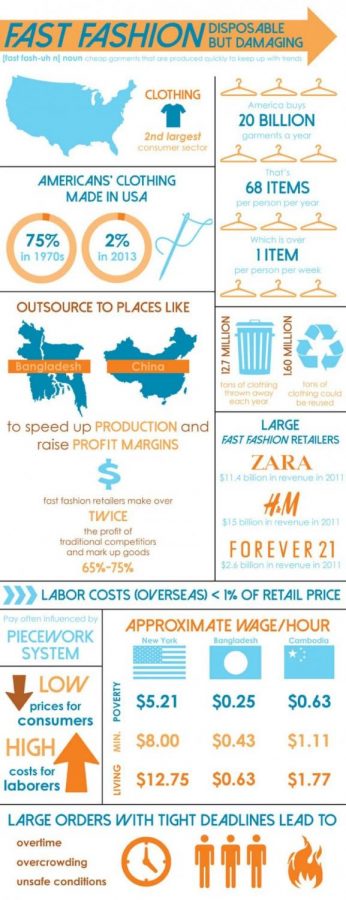Fast fashion needs to fall
With the rise of new trends, fast fashion creates a plethora of issues within our society
Drawers overflowing and racks full of clothes that have not been worn in months makes up many American’s closets. Millions of victims have fallen into the trap of purchasing the newest, upcoming trendy piece to add to their collection of garments. Little do many American’s know is that by buying a trendy item of clothing, they are supporting an oppressed cycle of unjust treatment for workers, creating a plethora of waste, and fueling the fire of deep rooted environmental problems. The practice of acquiring a minimal closet has completely gone out the window and has been replaced with an ever-growing, closet full of fast fashion garments.
Trends are constantly changing and marketing campaigns are working tirelessly to lure you into purchasing the new and hottest item. This makes it very easy to fall into consumerism.
Fast fashion can be defined as “an approach to the design, creation, and marketing of clothing fashions that emphasizes making fashion trends quickly and cheaply available to consumers” (Mariam Webster Dictionary). It has taken over the tactics of businesses, marketing, and the lives of consumers.
Although purchasing a clothing item from a store that sells fast fashion may be increasingly cheaper than a store that sells ethically made clothing, the quality of the garment may reflect the price of what you paid for it. When it comes to creating your closet, having the approach of sustainability and quality of the item over the price is important.
“Fast fashion companies design clothes that fall apart quickly. They pursue a strategy called ‘Planned obsolescence,” said Be Global Fashion Network. “This means to design garments to become unfashionable, wear out, lose shape or fall to pieces easily to force consumers to keep buying new clothes.”
Clothing from fast fashion companies, such as H&M, Zara, Forever21, and Urban Outfitters are not only designed to wear out, but also have a great effect on our world environmentally while being produced.
“A single t-shirt takes 2,700 liters of water to make. The same amount of water an average person drinks over the course of 900 days,” said Better Cotton Initiative.
The process of producing fast fashion is strenuous on the garment workers. Not only are many underpaid, but they are also overworked for their service. Additionally, 85% of garment workers are women (The True Cost).
Next time you contemplate buying a piece of clothing from a fast-fashion company, think about the effect you are causing on our environment with your purchase and instead, choose a more sustainable, ethically-made option.
If you do not know where to start, here are a few businesses that stay away from fast fashion and instead, produce sustainably and ethically made clothing.
I Broke Up With Fast Fashion and You Should Too | Gabriella Smith | TEDxWynwoodWomen






